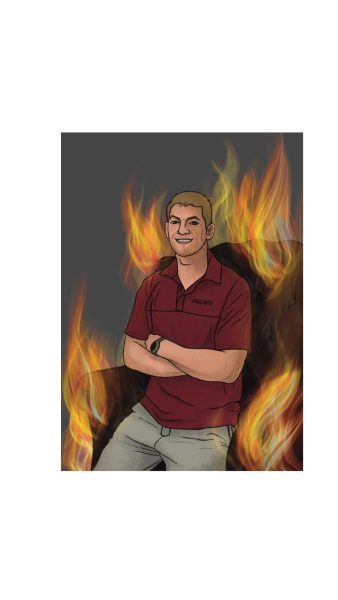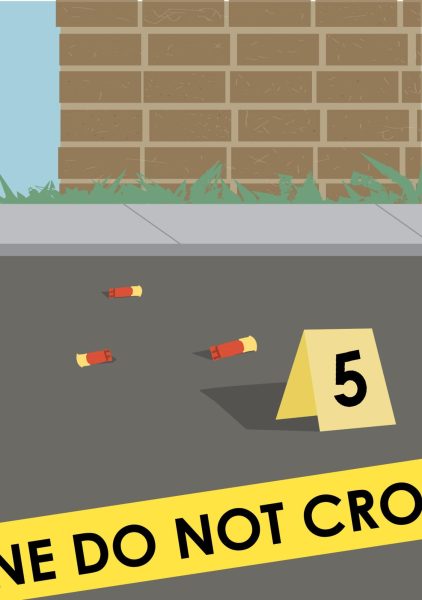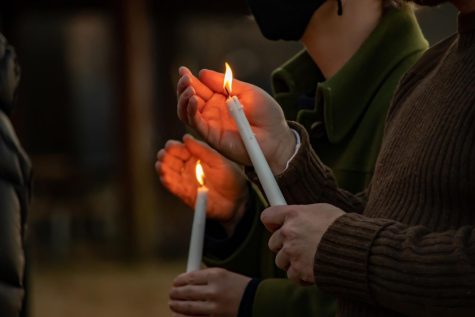Community Action: the battle against opioid addiction
Southern Illinois University’s School of Medicine is helping combat the opioid epidemic by freely distributing nasal spray that reverses the effects of an opioid overdose.
The Illinois Department of Human Services is assisting the medical school, and other community organizations, by providing naloxone (NARCAN) to the public. Naloxone is an opioid antagonist, binding to opioid receptors and potentially reversing and blocking the effects of opioids.
NARCAN can be used to reverse the effects of overdoses from heroin, morphine, oxycodone and many kinds of prescription pills. It is designed for community use, as no special training is required to use it.
Advertisement
Brent Vanham is the project coordinator for the Substance Use Disorder Leadership Program, which is housed in the Center for Rural Health and Social Service Development at the medical school. VanHam coordinated three events over the past few weeks to help distribute NARCAN to SIU students and members of the general public in partnership with Breaking the Chain and The Community Action Place.
“We’ve been coming over every other week and we’ve had very good reception,” Vanham said. “Typically we show up with one hundred and twenty units. Each box, which is one unit, has two doses in it.”
Will Nicholson gets out of bed every day to help people struggling with addiction get compassionate help. Nicholson, a former opioid user, works for Community Action Place, a Southern Illinois nonprofit that offers services to the community by providing clean syringes, overdose prevention training, harm reduction supplies, testing for sexually transmitted diseases, contraceptives for practicing safe sex, prEP enrollment and naxolone.
“It’s a struggle every day and that’s what people don’t understand exactly,” said Nicholson. “I just lost my best friend on the twenty eighth of August… He was off of it, and then did it once again.”
Breaking the Chain is a registered student organization at SIU that serves as an on-campus resource to raise awareness on the effects of substance use disorders.
Crystal Kendzior, president of Breaking the Chain, said she has held the idea of the organization in her mind for a long time. She is inspired by her own experiences with people who have been addicted to opioids and wants to create a community of support to help prevent addiction from reoccurring.
“Every addiction changes the chemistry in your brain, but coming off of opioids is especially hard because the withdrawal will make you feel like you’re in more pain than you ever were, even before taking medication, and it can feel like you’re dying,” Kendzior said.
Advertisement*
Breaking the Chain attends community events, and participates in community activities to learn about and provide awareness on opioid addiction and recovery. It welcomes any student who is passionate about the issue to fight for its cause.
Angie Bailey is the system director of the community benefits program at SIH. She said SIH has also been funded by the IDHS to distribute NARCAN. All of the hospitals in the area have an emergency department where anyone is able to go and get it free of charge, with no paperwork required.
Bailey said counties in the Southern Illinois region collaborate through coalitions and other efforts to combat opioid overdose. Every other month, leaders of all the coalitions meet to discuss updates on their efforts.
“It’s one of those things where there always could be more, and there could always be more volunteers, and there’s always more work to be done. It’s really an issue that affects so many,” Bailey said.
Anybody is encouraged to join both the coalitions and their action groups. Bailey said whoever wants to volunteer can reach out to Sandra Schwartz, community health coordinator at SIH.
Joe Cernvantez, Jackson County State’s Attorney, said he plans to create a drug court there, and provide assistance to those who struggle with drug addiction.
“Substance abuse disorder is a disease. We have been treating diseases as crimes,” Cervantez said. “Substance abuse disorder does lead to criminal activity, but we have to treat the underlying cause of the substance abuse disorder, not just the crime.”
Cervantez said drug courts help participants recover from substance abuse disorder. He said the aim of drug courts is to reduce future criminal activity by helping individuals with their substance disorder.
“As an alternative to incarceration, drug courts reduce the burden of cost to the community that are usually associated with repeatedly processing low level nonviolent offenders through our court system,” Cervantez said. “So, we’re making the community safer because putting them away for a year or two years or three years doesn’t solve the problem.”
Cervantez said when people are put in jail for drugs, they aren’t getting treatment. Therefore, when people with substance issues get released, they go right back into their environment.
Cervantez said he hopes to prevent this by potentially supporting some form of medication assisted treatment and access to behavioral counselors in jails.
For more information on Illinois opioid usage, go to ilpmp.org.
Staff reporter Kiersten Owens can be reached at [email protected]. To stay up to date with all your southern Illinois news, follow the Daily Egyptian on Facebook and Twitter.
Advertisement














Deborah Chapman • Nov 10, 2021 at 4:55 pm
Thank you for such an informative article. This is great news for the many families in Illinois who have had to deal with this problem. There are many pieces to this puzzle, and I applaud Jackson County’s State’s Attorney, Joe Cervantez, for his work on this. Great article, Kiersten.